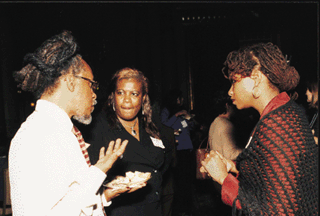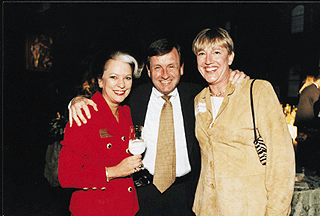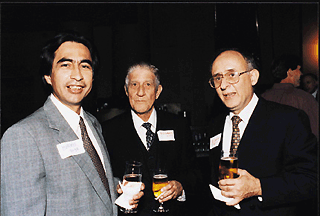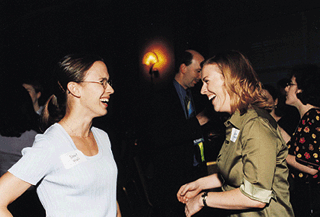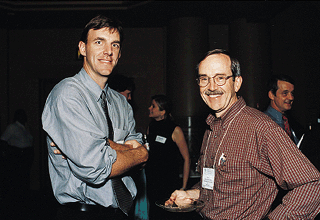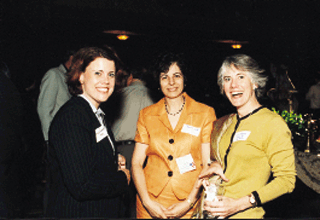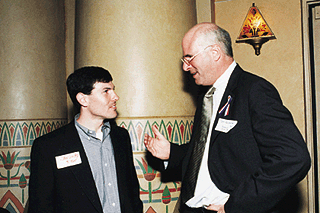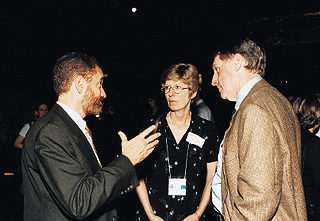Alumni News
Where the action is
Alumni Weekend
"The saddest place I've ever seen"
Class Notes
Where the action is
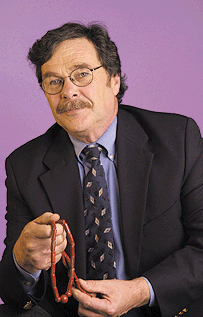
A Nigerian chief presented McConnon with these ceremonial earthen beads when he named him an
honorary chief and “Father of Medicine” for his work to eradicate guinea worm.
|
|
Patrick McConnon, 89MPH, was sleeping hard in a Washington, DC, hotel room this past October when
the phone rang around 2 am.
The nasal swabs of 29 Senate staffers working near the office of Sen. Tom Daschle had come back
positive for anthrax.
“I was shocked—floored that 29 people came back positive,” says McConnon, who was the lead
operations officer for the Centers for Disease Control and Prevention during the Washington, DC,
anthrax outbreak. “We were flabbergasted that so many people were exposed from that kind of spill.
It wasn’t like an open talcum powder container was shaken around a room. An envelope that was taped
around the sides was opened in a normal way and dropped on a counter.”
The unexpectedly wide dispersal of the anthrax required a more extensive public health response
than expected, and McConnon’s job was to manage the logistics. He had to set up the equivalent of a
CDC field office immediately. He called CDC headquarters in the middle of the night and asked for
20 epidemiologists with portable computers and cell phones. His order was filled within 24 hours.
The operation resulted in about 20,000 people receiving preventive antibiotics.
|
It wasn’t the first time McConnon has landed in the middle of the most urgent public health issues
of the day. Since he began working for CDC in 1967, McConnon has had assignments in 33 countries on
three continents, working on smallpox and guinea worm eradication, hantavirus, sexually transmitted
diseases, and refugee issues. These accomplishments earned him the RSPH Alumni Distinguished
Achievement Award for 2001. Ironically, the anthrax outbreak made McConnon miss the presentation of
his award at the RSPH alumni weekend celebration at the Fox Theater this past October. His wife
accepted it for him.
“I’m grateful I had the opportunity to earn my MPH in the middle of my career,” says McConnon. “If
Emory wasn’t right down the street from CDC, it would’ve been much more difficult. After work, I’d
just walk to class.”
When McConnon started his career during the 1960s, few public health workers had advanced degrees.
That changed during the 1980s, but full-time pursuit of an MPH wasn’t an option for McConnon, who
then had kids in college.So McConnon earned his degree through late afternoon and evening classes
at RSPH.
Soon after graduation, McConnon got a call from The Carter Center. He was asked to manage
operations for its guinea worm eradication program in Nigeria. The two-year assignment turned out
to be one of the most rewarding of McConnon’s career.
“They had set up multi-disciplinary state and national task forces on guinea worm,” he says. “They
needed someone to implement the strategies at the village level. They had identified 5,270 affected
villages, mostly rural, where guinea worm was a problem. The strategy involved health education,
communications, getting filter material to village residents, and protecting the water supply. We
had the chief in every village designate a person to carry out those activities. It was my job to
set up a structure for training and supervision.”
McConnon and his wife lived in Lagos for two years. “My wife worked full-time as a volunteer for
the guinea worm project. We loved every minute of it.”
The program was highly successful. Nigeria reported more than 650,000 cases of guinea worm in 1990,
and only 10,000 cases in 2000. Before McConnon left Nigeria in 1993, the chief of Okoko, NW, in the
Ondo State of Nigeria named him an honorary chief of the region, bestowing on him the title “Father
of Medicine.” He treasures the ceremonial earthen beads he received during the ceremony.
“This political jurisdiction was particularly hard hit by guinea worm, and they were able to get
rid of it with our help,” says McConnon. “But I didn’t do the heavy pulling. Their own people did
that. I just helped organize it. But it was nice to get that kind of positive feedback, just like
it’s nice to be recognized by the school that made it possible for me to earn an MPH.”
Alumni Weekend
A memorable reception at the Fabulous Fox Theater added a special poignancy to Alumni Weekend this
year. Just weeks after September 11, old friends and colleagues seemed to enjoy each other’s
company even more than usual.
The Alumni Distinguished Achievement Award was presented in absentia to Patrick McConnon, 89MPH. He
was in Washington, DC, helping lead CDC efforts against anthrax.
"The saddest place I’ve ever seen"
When Karin Lapping, 00MPH, returned to the vast tent cities along the Afghan-Pakistani border in
January 2001, things had visibly deteriorated. Food was scarce, tension was high, and the sprawling
camps were overflowing with people.
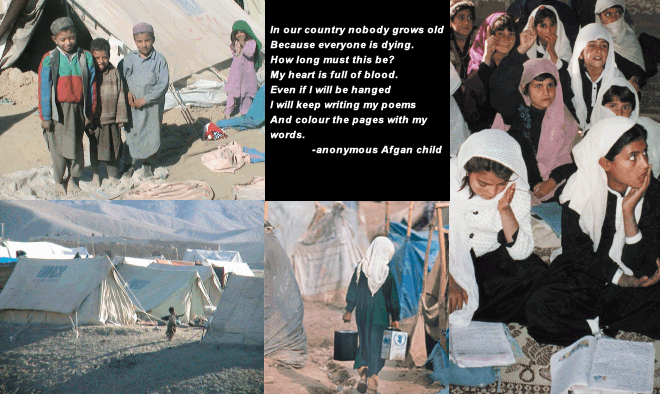
PHOTOS COURTESY OF SAVE THE CHILDREN
She had been there two years earlier as an international health student at the Rollins School of
Public Health, working for Save the Children on a trip sponsored by the school’s O. C. Hubert
International Fellowship Award. She returned as coordinator of Save the Children’s Positive
Deviancy Initiative. This program aims to identify the qualities of people who deviate from the
norm in positive ways in the midst of adverse circumstances. The aim is to then transfer these
qualities to the community at large.
Lapping conducted a survey during her second trip that revealed the unique refugee situation in the
camps.
“These are not your classic refugee camps," she says. “Some of the families have lived there for 15
or 20 years, part of the first wave of refugees out of Afghanistan when the Soviets invaded. They
are settled populations that have been out of their country for so long that their children were
born in the camps. They are the only homes many of the children have ever known.”
Entire villages in Afghanistan seem to have been transported to the refugee camps practically
intact. “So you suddenly have Pashtun, Tajik, and Uzbek villages crammed right next to each other,
each with vastly different lifestyles and values,” says Lapping.
While conducting a survey of one camp, she interviewed a niece of the Minister of Vice and Virtue
for the Taliban as well as a female doctor from Kabul who was not allowed to work when the Taliban
took over. Although the two women and their families lived practically side by side in the camp,
the gap between them was enormous.
“The camps are highly segregated along ethnic lines, which makes for some really explosive
politics. There are a lot of death threats and conflict. The village dynamics were really
disturbing in that sense.”
With each successive wave of refugees, the situation continues to erode, says Lapping.
“On my first trip, in 1999, the refugees were better off nutritionally than the surrounding
Pakistanis. At that time, Afghanistan was high on the radar screen for international aid. They
received edible oil and bulk food from several programs, and the clinics in the camps were much
better staffed than the clinics serving the Pakistani general population.”
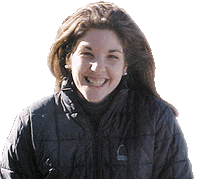 |
|
By January 2001, much of the world aid community appeared to have lost interest in
the situation. “There was a lot of donor fatigue,” she says.
“People were lining up at the border—starving and freezing to death. I
was shocked to see how much things had deteriorated. I’ve traveled to a lot of developing countries,
and this was the saddest place I’ve ever seen. I think that now there’s
a real chance that things will change for the better.”
|
Click here to read the Class Notes
Spring
2002 Issue |
Dean's Message | In
Brief | Innocence Lost |
Making
Smoking History |
Alumni News |
Rollins School of Public Health
Copyright
© Emory University, 2002. All Rights Reserved.
Send comments to hsnews@emory.edu.
|

